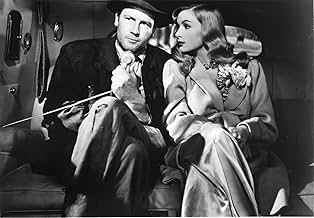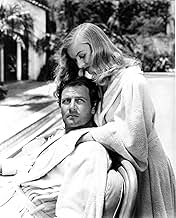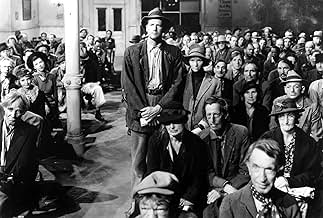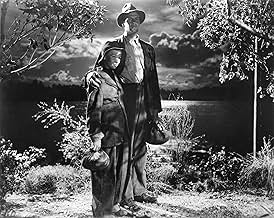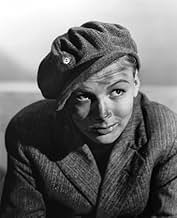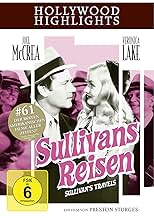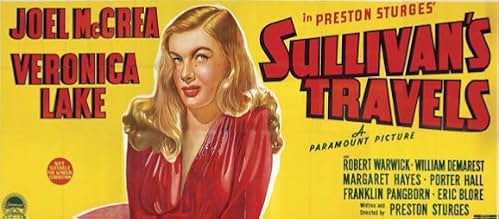VALUTAZIONE IMDb
7,9/10
30.053
LA TUA VALUTAZIONE
Il regista di Hollywood John L. Sullivan vuole fare esperienza vivendo come un senzatetto per prepararsi al meglio per il suo prossimo film.Il regista di Hollywood John L. Sullivan vuole fare esperienza vivendo come un senzatetto per prepararsi al meglio per il suo prossimo film.Il regista di Hollywood John L. Sullivan vuole fare esperienza vivendo come un senzatetto per prepararsi al meglio per il suo prossimo film.
- Regia
- Sceneggiatura
- Star
- Premi
- 2 vittorie totali
Charles R. Moore
- Colored Chef
- (as Charles Moore)
Recensioni in evidenza
Sturges' most daringly double-edged film, laced with bitter ironies. It is also arguably the most audacious film in Hollywood's (mainstream) history, audacious because it takes the kinds of risks that can so easily fall flat on their face, and right until the final image, as Sturges becomes increasingly ambitious and multi-layered, you wonder how long he can keep it up without getting ridiculous. It never does, but the film is so full of contradictions, tensions, suppressions, clanging lurches in tone - 'Travels' is ostensibly a comedy, and one of Hollywood's best, but the last twenty minutes are truly painful to watch, harrowing and not at all funny.
The overriding source of tension, of course, is the film itself, the plot, and the emotions that are supposed to be elicited. It is very difficult, and frequently impossible to gauge the tone of any one scene. Sometimes this is straightforward, as when information is deliberately withheld from the audience, it is asked to make a judgement, and then shown to be wrong, as in the scenes where the studio moguls claim a background of deprivation (which is historically plausible). This kind of comedy is familiar enough.
But what about the later montage of Sullivan and the Girl experiencing the 'reality' of poverty - are these scenes supposed to be genuine representation of poverty? Are they part of a wider satire on pious films like 'Grapes of Wrath', which dubiously aestheticise poverty - there are a lot of Expressionistic flourishes in this sequence? Are they a kind of abstract purgatory through which Sullivan finds spiritual understanding?
There is a big difference between the representation of poverty in this sequence and the one where Sullivan is attacked and sent to prison. But is one more 'authentic' than the other - the second one bravely rejects the view of 'noble' poverty, shows how it dehumanises people, turns them instinctual and brutal; but it also provides a neat moral, which suggests that if you do somebody wrong, you will be (horribly) punished for it. This realism, therefore, is as contrived as the first. Is this Sturges' point, that the good intentions of realism are always tainted by ideological assumptions, patronising good-will, or motives of elevation. This sense of artifice, of a film comprised of varying self-reflexive modes rather than a plausible narrative, runs through 'Travels', with characters talking about the film they're in as a plot - in direst danger, Sullivan acknowledges the need for a helluva twist which duly arrives, filmed in silent slapstick with barely concealed Sturges contempt (and did his friends seem terribly put out by his death?).
This would seem to uphold 'Travels'' ostensible theme, its celebration of comedy as a sugar with which to sweeten the harshness of reality. This is a very cynical view of comedy, and a highly manipulative, conservative one - distract an unhappy populace from the injustice of their lives. The best comedies - from 'Sherlock Jr' and 'Modern Times' to 'Playtime' and 'The Discreet Charm of the Bourgeoisie' have always been about real life, encouraging their viewers to think harder about the society they live in, much more effectively than so-called naturalism.
'Travels' is no exception. It might be a celebration of comedy, but this is comedy a million miles from 'Ants in your Pants'. What other 40s film still manages to show the brutality of poverty, of the prison system, of race relations, the fate of young women in sexually voracious Hollywood (the Girl's ease with her body in the swimming pool scene speaks volumes), however we choose to read them? When Sullivan's determination at the end to continue making populist comedies is endorsed by the ringing laughter of the world's meek and suffering, the disjunction is grotesque. This is a man, on an airplane, completely removed from reality, surrounded by wealthy toadies. Those happy laughs could so easily be contemptuous guffaws, because what Sullivan wants to do, and Sturges hasn't, is hide the inequalities of capitalism, the system on which Hollywood thrives, and the flaws in which they would be only too happy to cover up with inanity. But to even suggest this is to fall into the 'Capra' trap mocked at the beginning.
This difficulty is what makes 'Travels' such a stunningly modern film - its shifts from sophisticated verbal wit to elaborate slapstick to blatant Carry On-like innuendo (the matronly sister dusting the bedpost after seeing a sweating, shirtless Sullivan work) to tragedy to hallucination and dream to satire foreshadows Melville and the New Wave, while the privileged rich man who cannot escape Hollywood would transmute into the guests who can't leave the house, or can't get dinner in later Bunuel films; or the film that begins with an end. The opening sequence takes off 'Citizen Kane'. The deadpan genderplay is quietly gobsmacking, and Veronica Lake as a (gorgeous) tramp would be alluded to by Jeanne Moreau in 'Jules et JIm'. But the joys are all Sturges', as he democratises comedy (see again that swimming pool sequence); I love in particular those glorious supporting actors: my favourite being the immortal Eric Blore and Robert Greig as Sullivan's servants.
The overriding source of tension, of course, is the film itself, the plot, and the emotions that are supposed to be elicited. It is very difficult, and frequently impossible to gauge the tone of any one scene. Sometimes this is straightforward, as when information is deliberately withheld from the audience, it is asked to make a judgement, and then shown to be wrong, as in the scenes where the studio moguls claim a background of deprivation (which is historically plausible). This kind of comedy is familiar enough.
But what about the later montage of Sullivan and the Girl experiencing the 'reality' of poverty - are these scenes supposed to be genuine representation of poverty? Are they part of a wider satire on pious films like 'Grapes of Wrath', which dubiously aestheticise poverty - there are a lot of Expressionistic flourishes in this sequence? Are they a kind of abstract purgatory through which Sullivan finds spiritual understanding?
There is a big difference between the representation of poverty in this sequence and the one where Sullivan is attacked and sent to prison. But is one more 'authentic' than the other - the second one bravely rejects the view of 'noble' poverty, shows how it dehumanises people, turns them instinctual and brutal; but it also provides a neat moral, which suggests that if you do somebody wrong, you will be (horribly) punished for it. This realism, therefore, is as contrived as the first. Is this Sturges' point, that the good intentions of realism are always tainted by ideological assumptions, patronising good-will, or motives of elevation. This sense of artifice, of a film comprised of varying self-reflexive modes rather than a plausible narrative, runs through 'Travels', with characters talking about the film they're in as a plot - in direst danger, Sullivan acknowledges the need for a helluva twist which duly arrives, filmed in silent slapstick with barely concealed Sturges contempt (and did his friends seem terribly put out by his death?).
This would seem to uphold 'Travels'' ostensible theme, its celebration of comedy as a sugar with which to sweeten the harshness of reality. This is a very cynical view of comedy, and a highly manipulative, conservative one - distract an unhappy populace from the injustice of their lives. The best comedies - from 'Sherlock Jr' and 'Modern Times' to 'Playtime' and 'The Discreet Charm of the Bourgeoisie' have always been about real life, encouraging their viewers to think harder about the society they live in, much more effectively than so-called naturalism.
'Travels' is no exception. It might be a celebration of comedy, but this is comedy a million miles from 'Ants in your Pants'. What other 40s film still manages to show the brutality of poverty, of the prison system, of race relations, the fate of young women in sexually voracious Hollywood (the Girl's ease with her body in the swimming pool scene speaks volumes), however we choose to read them? When Sullivan's determination at the end to continue making populist comedies is endorsed by the ringing laughter of the world's meek and suffering, the disjunction is grotesque. This is a man, on an airplane, completely removed from reality, surrounded by wealthy toadies. Those happy laughs could so easily be contemptuous guffaws, because what Sullivan wants to do, and Sturges hasn't, is hide the inequalities of capitalism, the system on which Hollywood thrives, and the flaws in which they would be only too happy to cover up with inanity. But to even suggest this is to fall into the 'Capra' trap mocked at the beginning.
This difficulty is what makes 'Travels' such a stunningly modern film - its shifts from sophisticated verbal wit to elaborate slapstick to blatant Carry On-like innuendo (the matronly sister dusting the bedpost after seeing a sweating, shirtless Sullivan work) to tragedy to hallucination and dream to satire foreshadows Melville and the New Wave, while the privileged rich man who cannot escape Hollywood would transmute into the guests who can't leave the house, or can't get dinner in later Bunuel films; or the film that begins with an end. The opening sequence takes off 'Citizen Kane'. The deadpan genderplay is quietly gobsmacking, and Veronica Lake as a (gorgeous) tramp would be alluded to by Jeanne Moreau in 'Jules et JIm'. But the joys are all Sturges', as he democratises comedy (see again that swimming pool sequence); I love in particular those glorious supporting actors: my favourite being the immortal Eric Blore and Robert Greig as Sullivan's servants.
As original a piece from the 1940s as you'll likely come across and one where it could quite easily have found itself as knotted and gnarled as some of the boots seen pounding the highways and byways of its cast. Fortunately those pretentious rips fail to appear and it's the arrival of Veronica Lake that turns the ramble to a journey and an illustration as relevant today about the lack of opportunity we continually chose to turn a blind eye to. An interesting twist towards the end provides something to chew on and supports a finale that may well give you a little to smile about, maybe even a chuckle.
As a TV Producer of "entertainment" shows, I make a point of watching this film at least once a year and giving DVDs of it to all who may disparage what I do.
Preston Sturges achieves the impossible in this movie: he has his cake and eats it too. He makes a perfect film - he manages to make a socially significant statement while wrapping it up in a comedy confection.
His hero, John L. Sullivan (Joel McCrea - a very underestimated actor) is a
succcessful director of frivolous musicals and comedies who, one day, decides he needs to make a Capra-esque "serious"film. His studio chiefs and immediate staff are against it and point out that he is rich and privileged, what does he know about the less fortunate? Sullivan retorts with an ingenious plan:
Sullivan: "You're perfectly right...but I'll tell you what I'm going to do first: I'm going to get some old clothes and some old shoes from wardrobe and start out with ten cents in my pocket...and I'm not coming back till I know what trouble it..I'm going out on the road to find out what it's like to be poor and needy and then I'm going to make a picture about it."
Burrows(his butler): If you'll permit me to say so, sir, the subject is not an interesting one. The poor know all about poverty and only the morbid rich would find the topic glamorous.
Nevertheless, Sullivan does it and unwittingly (and hilariously) discovers the true value comedy has in the lives of those with little else to laugh about...
It's genius. Exquisitely written, directed and acted (Sturges uses his usual ensemble plus the ever watchable Veronica Lake, even here in her most improbable disguises [I met her, professionally, in England in the 70s, she was still a class act and her "rider" demanded her drink of choice - vodka and cranberry juice).
Sullivan's Travels is a true gem of American Cinema. Ten out of ten.
Preston Sturges achieves the impossible in this movie: he has his cake and eats it too. He makes a perfect film - he manages to make a socially significant statement while wrapping it up in a comedy confection.
His hero, John L. Sullivan (Joel McCrea - a very underestimated actor) is a
succcessful director of frivolous musicals and comedies who, one day, decides he needs to make a Capra-esque "serious"film. His studio chiefs and immediate staff are against it and point out that he is rich and privileged, what does he know about the less fortunate? Sullivan retorts with an ingenious plan:
Sullivan: "You're perfectly right...but I'll tell you what I'm going to do first: I'm going to get some old clothes and some old shoes from wardrobe and start out with ten cents in my pocket...and I'm not coming back till I know what trouble it..I'm going out on the road to find out what it's like to be poor and needy and then I'm going to make a picture about it."
Burrows(his butler): If you'll permit me to say so, sir, the subject is not an interesting one. The poor know all about poverty and only the morbid rich would find the topic glamorous.
Nevertheless, Sullivan does it and unwittingly (and hilariously) discovers the true value comedy has in the lives of those with little else to laugh about...
It's genius. Exquisitely written, directed and acted (Sturges uses his usual ensemble plus the ever watchable Veronica Lake, even here in her most improbable disguises [I met her, professionally, in England in the 70s, she was still a class act and her "rider" demanded her drink of choice - vodka and cranberry juice).
Sullivan's Travels is a true gem of American Cinema. Ten out of ten.
10jhclues
When it comes right down to it, what you `think' you want isn't necessarily what you `really' want, nor is it likely to be anything you need. But finding the answer is up to the individual, a prospect that's explored in the satirical `Sullivan's Travels,' directed by Preston Sturges. Movie director John L. Sullivan (Joel McCrea) has made a career of churning out one successful comedy after another, yet he remains unfulfilled. He longs to do a `serious' film, one with meaning, a drama that will leave his mark on the industry and the world. And he has a property that he thinks is perfect, a screenplay entitled `O Brother, Where Art Thou?' The studio he works for, however, balks at the idea; Sullivan's comedies are not only good, they're a cash cow for the studio, so why fool with success?
Sullivan is adamant, though, and determined to make his film he strikes a bargain with the studio and gets the green light. But once he's given the go-ahead, he wants to do it right-- and he realizes that to make a truly meaningful film, he must first experience himself the hardships of life he will be examining in `O Brother.' So with only a dime in his pockets, he sets out on the road to find out what `life' is really all about. And before it's over, he will get all he's looking for and more, in an odyssey that will be unforgettable for Sullivan, and for the audience, as well.
Filled with pathos and poignancy, Sturges' film is an insightful sojourn across the territory of the human condition. It'll make you laugh and it'll make you cry, as along with Sullivan you come face to face with some hard truths about reality. And Sullivan's eventual epiphany regarding his personal wants and needs may be your own, as well, because this is a film with a definite message that is honest and undeniable. A lesson in life delivered subtly and sensitively by Sturges, who makes it entertaining and thought provoking at the same time. It's refreshing, in fact, t discover a film that delivers such an impact without having to resort to any kind of sensationalism, relying instead on the inherent humanity of the story, which Sturges conveys masterfully. With exceptions, of course, it's a sensibility few of today's directors seem to possess. Some notable exceptions would be Ang Lee with `The Ice Storm,' Kenneth Lonergan's `You Can Count On Me' and Tom DiCillo's `Box of Moonlight.' All are films that, like `Sullivan,' are journeys of discovery, profound in sentiment without being overly sentimental. There are more, to be sure, but they seem too few and far between.
One of the elements that makes this film so engaging is its colorful cast of characters, and the actors it employs to bring it to life, beginning with it's star, McCrea, who hits his stride as Sullivan with facility. He credibly reflects Sullivan's ideals and principles with a look, as well as an attitude, that makes it work quite naturally. You can believe this is a man with, perhaps not a naive, but certainly a rather guarded perception of life in the real world. Which is not to say he lacks insight or wisdom; it's merely one of the basic truths this film points out-- that people live within parameters of their own design, established through personal experience and frame of reference. And that's the John Sullivan McCrea presents here, with a portrayal that is honest and incisive.
Veronica Lake was one of the hottest actresses around in 1942 when this film was made, and as the girl who becomes a part of Sullivan's journey, she lends considerable charm and a bit of mystique to the film. It's a fairly straightforward role that benefits from her sparkle and personality; a notable performance that adds a touch of humor and some class to the proceedings, without being particularly exceptional. But watching her, it's easy to understand the attention she received, especially after draping her long blond hair across her eye, peek-a-boo style-- which started a craze that swept the country, while creating an indelible image that ultimately defined her career.
The supporting cast includes Robert Warwick (Mr. Lebrand), William Demarest (Mr. Jones), Franklin Pangborn (Mr. Casalsis), Porter Hall (Mr. Hadrian), Byron Foulger (Mr. Valdelle), Margaret Hayes (Secretary), Robert Greig (Sullivan's Butler) and Eric Blore (Sullivan's Valet). Call it a lesson in life, or a lesson about human nature; however you see it, `Sullivan's Travels' is an experience you're going to remember. Entertaining, enjoyable and enlightening, it's an uplifting appreciation of the way things are, and not necessarily the way you `think' they should be. It's a film that celebrates the comfort to be found in finding your own niche and realizing the importance of whatever it is that you contribute to your world and those around you. It leaves you with a sense of purpose and the understanding that the grass is not always greener on the other side. And it makes your own grass look pretty good in the bargain. It's the magic of the movies. I rate this one 10/10.
Sullivan is adamant, though, and determined to make his film he strikes a bargain with the studio and gets the green light. But once he's given the go-ahead, he wants to do it right-- and he realizes that to make a truly meaningful film, he must first experience himself the hardships of life he will be examining in `O Brother.' So with only a dime in his pockets, he sets out on the road to find out what `life' is really all about. And before it's over, he will get all he's looking for and more, in an odyssey that will be unforgettable for Sullivan, and for the audience, as well.
Filled with pathos and poignancy, Sturges' film is an insightful sojourn across the territory of the human condition. It'll make you laugh and it'll make you cry, as along with Sullivan you come face to face with some hard truths about reality. And Sullivan's eventual epiphany regarding his personal wants and needs may be your own, as well, because this is a film with a definite message that is honest and undeniable. A lesson in life delivered subtly and sensitively by Sturges, who makes it entertaining and thought provoking at the same time. It's refreshing, in fact, t discover a film that delivers such an impact without having to resort to any kind of sensationalism, relying instead on the inherent humanity of the story, which Sturges conveys masterfully. With exceptions, of course, it's a sensibility few of today's directors seem to possess. Some notable exceptions would be Ang Lee with `The Ice Storm,' Kenneth Lonergan's `You Can Count On Me' and Tom DiCillo's `Box of Moonlight.' All are films that, like `Sullivan,' are journeys of discovery, profound in sentiment without being overly sentimental. There are more, to be sure, but they seem too few and far between.
One of the elements that makes this film so engaging is its colorful cast of characters, and the actors it employs to bring it to life, beginning with it's star, McCrea, who hits his stride as Sullivan with facility. He credibly reflects Sullivan's ideals and principles with a look, as well as an attitude, that makes it work quite naturally. You can believe this is a man with, perhaps not a naive, but certainly a rather guarded perception of life in the real world. Which is not to say he lacks insight or wisdom; it's merely one of the basic truths this film points out-- that people live within parameters of their own design, established through personal experience and frame of reference. And that's the John Sullivan McCrea presents here, with a portrayal that is honest and incisive.
Veronica Lake was one of the hottest actresses around in 1942 when this film was made, and as the girl who becomes a part of Sullivan's journey, she lends considerable charm and a bit of mystique to the film. It's a fairly straightforward role that benefits from her sparkle and personality; a notable performance that adds a touch of humor and some class to the proceedings, without being particularly exceptional. But watching her, it's easy to understand the attention she received, especially after draping her long blond hair across her eye, peek-a-boo style-- which started a craze that swept the country, while creating an indelible image that ultimately defined her career.
The supporting cast includes Robert Warwick (Mr. Lebrand), William Demarest (Mr. Jones), Franklin Pangborn (Mr. Casalsis), Porter Hall (Mr. Hadrian), Byron Foulger (Mr. Valdelle), Margaret Hayes (Secretary), Robert Greig (Sullivan's Butler) and Eric Blore (Sullivan's Valet). Call it a lesson in life, or a lesson about human nature; however you see it, `Sullivan's Travels' is an experience you're going to remember. Entertaining, enjoyable and enlightening, it's an uplifting appreciation of the way things are, and not necessarily the way you `think' they should be. It's a film that celebrates the comfort to be found in finding your own niche and realizing the importance of whatever it is that you contribute to your world and those around you. It leaves you with a sense of purpose and the understanding that the grass is not always greener on the other side. And it makes your own grass look pretty good in the bargain. It's the magic of the movies. I rate this one 10/10.
No need to add to the praise others have justly given this classic, but there's one thing I think is especially clever about the plot (without giving too much of it away). The apparent moral of this Depression-era movie is that bad as conditions may be, audiences don't need to be reminded about them, instead needing escapist fare to distract them from the world's problems. Meanwhile, after setting you up to relax and enjoy a screwball comedy, Sturges succeeds in surreptitiously drawing you into just the kind of bleak "social consciousness" movie his characters are saying is impossible to get people to watch, without your realizing it at the time. Well, without my realizing it, anyway, until much later.
Lo sapevi?
- QuizCinematographer John Seitz admired Preston Sturges' unconventional approach to his work. The opening scene comprised ten pages of dialogue to cover about four and a half minutes of screen time. It was scheduled for two complete days of shooting. On the morning of the first day, Seitz found Sturges inspecting the set with a viewfinder, looking for where he could cut the scene and change camera set-ups. Seitz dared him to do it all in one take. Never one to refuse a dare, Sturges took him up on it, although the nervous Seitz had never attempted to complete a two-day work schedule in one day. With the endorsement of McCrea and the rest of the actors, Sturges pressed on, determined to set a record. The first take was fine, but the camera wobbled a little in the tracking shot following the men from screening room to office, so they tried again. They did two or three takes at the most and that was it - two full days work by 11 a.m. on the first day, a feat that had the entire studio buzzing.
- BlooperWhen Sullivan and the Girl jump off the train and walk to the lunch stand, nothing is visible around the outside of the lunch stand--not a car, tree or anything. When Sullivan asks if the proprietor had seen a land yacht (a big RV), the proprietor points to the side and they look out the window and see the big land yacht parked there. Of course, if it had been there in the first place, Sullivan would have seen it right away and not gone into the lunch stand.
- Citazioni
[last lines]
John L. Sullivan: There's a lot to be said for making people laugh. Did you know that that's all some people have? It isn't much, but it's better than nothing in this cockeyed caravan.
- Curiosità sui creditiThe Paramount logo appears as a seal on a package.
The package is opened to reveal a book with the film title on it and the opening credits appear on pages in the book.
- ConnessioniFeatured in The Cinematographer (1951)
- Colonne sonoreSpring Song
(1844) (uncredited)
Written by Felix Mendelssohn
Played as part of the score when Sullivan starts his experiment
Reprised when he starts a second time
I più visti
Accedi per valutare e creare un elenco di titoli salvati per ottenere consigli personalizzati
Dettagli
Botteghino
- Budget
- 689.665 USD (previsto)
- Lordo in tutto il mondo
- 10.390 USD
- Tempo di esecuzione
- 1h 30min(90 min)
- Colore
- Proporzioni
- 1.37 : 1
Contribuisci a questa pagina
Suggerisci una modifica o aggiungi i contenuti mancanti


